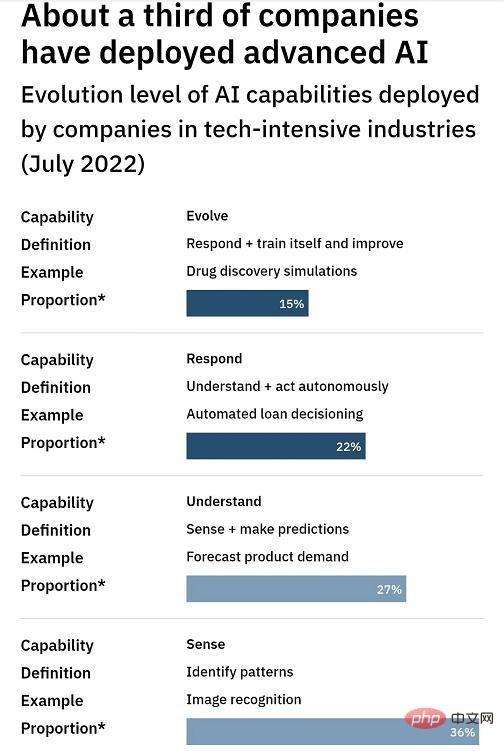
This report points out that many companies fail to convert data science efforts and artificial intelligence implementation into real economic value. The survey of 2,500 technology leaders found that despite high expectations for AI technology, only a quarter of respondents said they were very satisfied with its performance.

ITSP Infosys pointed out in this report that the missing value of all the companies surveyed is equivalent to US$460 billion in profits. And those companies that stand to gain the most from AI are focused on ensuring data science is integrated into the business, not just a side project.
Mohit Joshi, president of the company, said: “It is critical that enterprises do not look at data and artificial intelligence separately from the business, but look at it differently.” The report’s key findings are that solving Plans should focus on three areas: data sharing, trust in advanced artificial intelligence, and business priorities.
The report shows that despite high expectations when first launching an AI project, most companies fail to take action in one or more of these key areas. Overall, 63% of AI models perform only basic functions, are driven by humans, and often have deficiencies in data validation, data practices, and data strategies.

Only 26% of respondents said they were very satisfied with their data and artificial intelligence tools. Joshi said: "While the applications of AI are fascinating, something is clearly missing." Smart applications instead of moving to cloud computing solutions, which can cause problems down the road.
He explained, “For business problems and artificial intelligence systems, enterprises need to control and master the most effective and useful data. Therefore, trusting artificial intelligence is also important.
Our research found that advanced AI requires trust in the AI to achieve optimal performance. If the people working with the AI don’t trust the AI, then the model is at risk of going unused. Best practices for data ethics and bias management are Advancing the core of artificial intelligence."
The survey also included that three-quarters of enterprises want to operate artificial intelligence across their business lines, but most enterprises are new to artificial intelligence and are struggling to scale up their applications. face daunting challenges, largely due to a lack of skills and recruitment difficulties.
The “Data AI Radar” study was conducted by ITSP Infosys Corporate Knowledge Institute. The institute found that so-called "high-performing" companies view AI and data differently, with those that treat data as currency - sharing it and making it circulate - reaping the highest returns.
The research team found that when data is treated as currency and circulated through a hub-and-spoke data management model, enterprises may gain $105 billion in incremental value to those that update data with low latency Even more profits, revenue, and other measures of value can be generated.
The survey report points out that in addition to revenue growth, companies that are very satisfied with using artificial intelligence have consistently trusted, ethical and responsible data practices that can overcome the challenges of data validation and bias. Build trust and enable practitioners to use deep learning and other advanced algorithms.
Companies that apply data science to real needs also create additional value, improve efficiency, and generate an additional $45 billion in profit growth.
When asked whether it is difficult for companies to follow the rapid development of artificial intelligence, Joshi said, "The question is whether companies can achieve good results when applying artificial intelligence. Artificial intelligence and machine learning require a new approach mindset, this is where businesses need to shift. While machine learning and AI are advancing rapidly, we see it is businesses that are redefining their approach to data to gain the most from machine learning and AI. value.”
 Part of this is taking the data for AI tools and preparing it in a way that’s right for the business, which includes recognizing the need to combine that data with Encourage a combination of practices shared through a hub-and-spoke data management system.
Part of this is taking the data for AI tools and preparing it in a way that’s right for the business, which includes recognizing the need to combine that data with Encourage a combination of practices shared through a hub-and-spoke data management system.
Joshi said, "We believe that data is a new currency. Data is like currency and will increase in value when it circulates. Many companies realize that the emerging data economy has huge potential and cooperate with Building a data-sharing ecosystem of partners and peers can bring greater benefits than operating in isolation,"
This is different from the traditional thinking of requiring data set. Joshi said they found that a system that centralizes and organizes data and then relies on radiating the data to teams to freely operate and use it flexibly is the best approach. For example, importing data from third parties and high levels of data sharing drive greater profits than any other data or AI action.
'Model operations' can help scale AI systems
If companies don't take action now and think about AI and machine learning differently, Joshi said, Then you will face limitations, become dissatisfied with AI systems, and get stuck in the new data economy. He added: “Enterprises need to adopt an AI deployment framework that not only allows for experimentation but also scales AI in a predictable way.
Concepts like ‘model operations’ can provide a perspective for enterprises , to build a scalable platform driver that can increase flexibility during rollout, ensure process standardization, and support support as a measure of baseline model performance."
Joshi said another important The aspect is to ensure that businesses adhere to ethical and legal practices, especially during the transition period when governments are enacting legislation to prevent data misuse and unethical behavior.
He said: “AI must be adopted in a sustainable and thoughtful way so that it can coexist with the fabric of our society and bring greater benefits. It is therefore important that in any AI The tech industry must facilitate discussions within and across industry, communities and regulators about the benefits, costs and consequences of technology before it is released into the public domain."
The above is the detailed content of ITSP Infosys survey finds: Artificial intelligence and data science do not bring economic value to enterprises. For more information, please follow other related articles on the PHP Chinese website!




